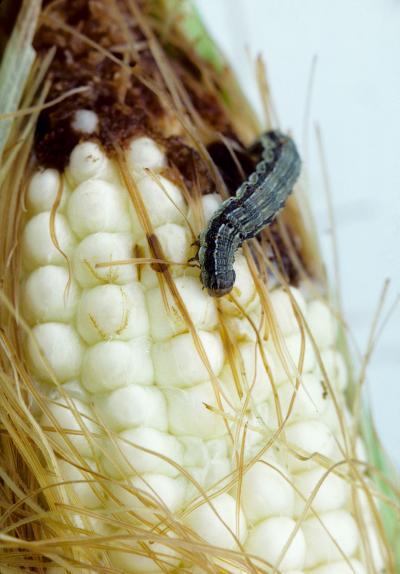Since 1996, corn containing a gene that allows it to create a protein that is toxic to certain insects yet is safe for human consumption has been grown in the United States.
Most of this genetically modified "Bt corn" has been used for animal feed or processed into corn meal, starch, or other products. Varieties of sweet corn (corn on the cob) have existed since the late 1990s, though relatively few acres have been planted related to the impact of marketing campaigns against it by activist groups.
A new study doesn't rehash the well-documented safety issue and instead deals with the environmental aspects. It suggests that Bt sweet corn is better for the environment because it requires fewer pesticide applications than conventional corn.
The study analyzed the performance of Bt sweet corn, comparing its rate of infestation and marketability to genetically identical varieties that lacked Bt proteins. In 2010 and 2011, sweet corn trials were conducted in New York, Minnesota, Maryland, Ohio and Georgia, locations that differ in climate, management practices and pest pressure. The authors found that for pest management of the corn earworm, Bt sweet corn consistently performed better than its non-Bt counterparts, even those that were sprayed with conventional insecticides.

The corn earworm is arriving earlier and in higher numbers in the northern US where much of the processing and fresh market sweet corn is grown. Photo by Jack Dykinga/USDA ARS Image Gallery
"Across multiple states and multiple years, Bt sweet corn performed better and required fewer sprays to meet market standards," said Cornell entomology professor Anthony Shelton. "One of the most spectacular examples occurred in New York plots in 2010: the Bt sweet corn had 99 to 100 percent marketable ears without any sprays and, even with eight conventional insecticide sprays, the non-Bt corn had only 18 percent marketable ears. This wasn't much better than the 6 percent marketable ears produced in the plots that received no sprays at all."
The authors predict that growers could realize increased profits with Bt sweet corn because of lower inputs and higher marketability, while simultaneously conserving populations of beneficial insects that keep damaging pests at bay.
"The use of Bt vegetables could significantly reduce the use of conventional insecticides and, in turn, reduce occupational and environmental risks that arise from intensive insecticide use," Shelton said.
"Our data suggest that using Bt sweet corn will dramatically reduce the use of traditional insecticides," the authors wrote. "Based on the performance of Bt field corn, growers should realize increased profits and there will be less risk to nontarget organisms, including natural enemies that help suppress pest densities."
"Multi-State Trials of Bt Sweet Corn Varieties for Control of the Corn Earworm (Lepidoptera: Noctuidae)" will be published in the Journal of Economic Entomology.






Comments